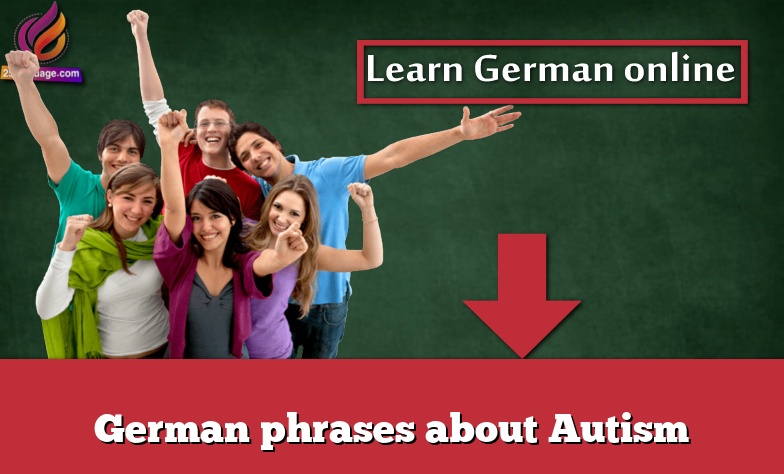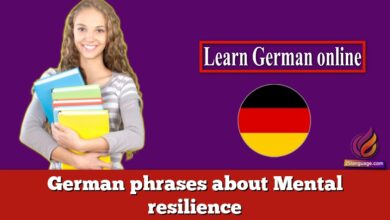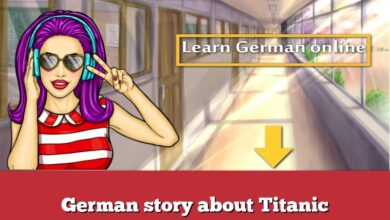German phrases about Autism

German phrases about Autism.Autism is not a “disease” to be “cured” in the conventional sense; it is a lifelong condition that necessitates a multidisciplinary approach for understanding and intervention. It represents a compelling enigma that calls for deep inquiry not just into how to support and educate those with the condition, but also into understanding the intricacies of the human mind and developing new methods for social interaction and communication.

German phrases about Autism
| English Phrase | German Phrase | Explanation or Context |
|---|---|---|
| Autism Spectrum Disorder | Autismus-Spektrum-Störung | General term for the range of autism disorders |
| High-Functioning Autism | Hochfunktionaler Autismus | Autism with less severe symptoms, often with high verbal skills |
| Early Intervention | Frühförderung | Specialized support and training given at a young age |
| Social Skills | Soziale Fähigkeiten | Skills for interacting socially, often a focus in autism therapy |
| Special Education | Sonderpädagogik | Education tailored to meet individual needs |
| Behavioral Therapy | Verhaltenstherapie | A common form of therapy used for children with autism |
| Sensory Sensitivity | Sensorische Empfindlichkeit | Heightened sensitivity to environmental factors like noise, light, etc. |
German vocabulary about Autism
| English Term | German Term | Explanation or Context |
|---|---|---|
| Autism | Autismus | The general term for Autism Spectrum Disorder. |
| Spectrum | Spektrum | Used to describe the range of symptoms and behaviors associated with autism. |
| Diagnosis | Diagnose | The identification and labeling of the condition typically by a medical professional. |
| Sensory | Sensorisch | Related to the senses (e.g., sight, hearing, touch), often an area of sensitivity for people with autism. |
| Meltdown | Zusammenbruch | Severe emotional or sensory overload often experienced by individuals with autism. |
| Therapy | Therapie | Treatment aimed at improving symptoms of autism. |
| Stimming | Stimming | Self-stimulating behaviors, often used as a coping mechanism for sensory overload. |
Symptoms of autism in German
| English Symptom | German Symptom | Explanation or Context |
|---|---|---|
| Social Challenges | Soziale Herausforderungen | Difficulties with social interactions, understanding social cues, and forming relationships. |
| Communication Difficulties | Kommunikationsschwierigkeiten | Difficulties in both verbal and non-verbal communication, including limited eye contact, facial expressions, etc. |
| Repetitive Behaviors | Wiederholendes Verhalten | Engaging in the same actions or thought processes repeatedly, like rocking back and forth or being fixated on a subject. |
| Limited Interests | Eingeschränkte Interessen | Intense focus on narrow subjects of interest, often to the exclusion of other activities. |
| Sensory Sensitivity | Sensorische Empfindlichkeit | Heightened or reduced response to pain, light, or sound; may also include fascination with lights or moving objects. |
| Speech Delay | Sprachverzögerung | Delay or absence in the development of spoken language. |
| Emotional Challenges | Emotionale Herausforderungen | Difficulties in understanding and expressing emotions; may have inappropriate emotional reactions. |
Treatment of autism in German
| English Treatment | German Treatment | Explanation or Context |
|---|---|---|
| Applied Behavior Analysis (ABA) | Angewandte Verhaltensanalyse (AVA) | A commonly used therapy focusing on improving specific behaviors through reinforcement. |
| Speech Therapy | Sprachtherapie | Focused on improving verbal communication skills and understanding non-verbal cues. |
| Occupational Therapy | Ergotherapie | Helps individuals with autism develop the skills needed for daily living and independence. |
| Sensory Integration Therapy | Sensorische Integrationstherapie | Aimed at helping individuals with autism cope with sensory issues. |
| Social Skills Training | Training sozialer Fähigkeiten | Group or individual training to improve social interaction abilities. |
| Special Education | Sonderpädagogik | Educational settings tailored to meet the individual needs of the child. |
| Medication for Co-Existing Conditions | Medikation für Begleiterkrankungen | Medication used to treat conditions that often co-exist with autism, such as ADHD or anxiety. |
| Parent-Implemented Intervention | Elterngesteuerte Intervention | Parents are trained to implement therapeutic techniques at home. |
Finally, let’s make autism not a subject of controversy or pity, but an opportunity for mutual growth and shared learning. Hope is real, and the future begins now.































